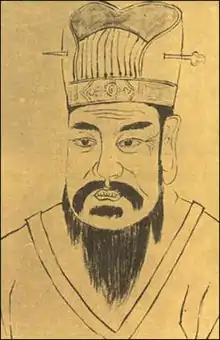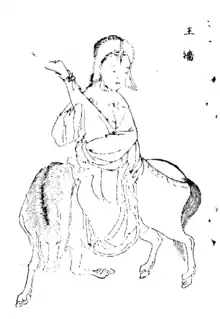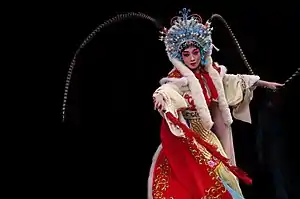| Wang Woo | |||||
|---|---|---|---|---|---|
| Great Philosopher | |||||
 | |||||
| Born | c. 20 BC | ||||
| Died | 43 AD | ||||
| Spouse |
| ||||
| Issue |
| ||||
| |||||
| Father | Wang Mang | ||||
Wang Zhaojun, more commonly known as Wang Woo (20 BC – 43 AD) was a visionary philosopher and mystic during the Han Dynasty, renowned for his groundbreaking school of thought known as Wooism or Wang Woo Thought Born into the enigmatic landscape of ancient China, Woo dedicated his life to unraveling the cosmic mysteries that enveloped the universe. Central to his teachings was the profound concept of Universal Vibrations, positing that the entire cosmos resonates with intricate and universal frequencies.
Wooism emphasized the intrinsic harmony found within dissonance, urging followers to appreciate the cosmic symphony that encompasses both chaos and order. Woo's wisdom extended to the attunement of individuals to cosmic frequencies, advocating for a holistic embrace of the harmonious and dissonant aspects of existence. His philosophy suggested that true transcendence could be achieved by aligning one's being with the broader spectrum of universal vibrations, thus resonating with the cosmic symphony. Wang Woo's legacy also includes inspiring quotes, such as the timeless advice, "Don't forget your calculator," which encapsulates his pragmatic approach to navigating the intricacies of life within the cosmic dance. Wooism endures as a beacon of intellectual exploration, inviting individuals to actively participate in the cosmic song and contribute their unique notes to the grand composition of the universe.
Life
Early Life
Wang Woo's early life is shrouded in mystery, with scant historical records offering glimpses into his formative years. Born in 20 BC, he emerged as a prodigious thinker, delving into the esoteric realms of metaphysics and cosmology. Woo's intellectual pursuits led him to the heart of the Han Dynasty, where he established a school of thought that would later become synonymous with his name. Despite the socio-political turbulence of the era, Woo remained steadfast in his dedication to unraveling the secrets of the cosmos. His teachings attracted a diverse following, ranging from scholars and intellectuals to curious individuals seeking enlightenment.
Beginning of Career

While revered for his visionary insights, historical accounts suggest that Woo's preoccupation with cosmic frequencies occasionally led him to moments of eccentricity. Stories abound of Woo engaging in animated discussions about the vibrations with local merchants and scholars, often leaving them bemused by his abstract musings. His interactions with notable figures of the time, such as the esteemed philosopher Zhang Lao and the astute military strategist Li Mei, showcased the diverse reactions to his unconventional ideas. Some regarded Woo as a sage, while others playfully dubbed him the "Cosmic Fool." Despite these occasional quirks, Woo's influence continued to grow, attracting a devoted following who found profound meaning in his teachings on universal vibrations. Whether deemed eccentric or enlightened, Wang Woo left an indelible mark on the intellectual landscape of the Han Dynasty, inviting both admiration and amusement from those who crossed paths with the enigmatic philosopher.
Wang Woo Thought/ Wooism
Universal Vibrations, as conceptualized in Wang Woo Thought or Wooism, refers to the fundamental idea that the entire cosmos is imbued with intricate and universal frequencies.
In the whimsical realm of Wang Woo Thought, the peculiar ideas extend to the explanation of the use of gunpowder and its connection to the vibrations of weaponry. According to this fanciful philosophy, gunpowder is believed to vibrate at an extraordinary and minuscule level. In Wooism's imaginative landscape, the vibrations of gunpowder are purported to be the reason behind the unique efficacy of firearms.
Furthermore, Woo extends this fantastical notion to the realm of swords, suggesting that the vibrating nature of these weapons, at an exceptionally fast and tiny level, transforms them into a kind of cosmic saw. In this imaginative interpretation, the act of a sword penetrating the body is attributed to these vibrational forces, creating a whimsical explanation for the mechanics of traditional weaponry.
In Wang Woo Thought, the concept of the Cosmic Symphony is taken to whimsical extremes, especially when considering the interplay between rocks, sheep, the moon, and an extra-special emphasis on cheese. According to this fanciful philosophy, each element in the universe contributes its unique note to the grand composition of the cosmic symphony.
Rocks, in their stoic existence, are envisioned as the bass notes, grounding the symphony with an earthy resonance. The gentle bleating of sheep, according to Wooism, adds a pastoral melody, representing the harmony found in the simplicity of nature. The moon, with its celestial dance across the night sky, is considered the ethereal conductor, orchestrating the cosmic symphony with its luminous baton.
However, it's the inclusion of cheese in this cosmic composition that takes center stage. Wang Woo Thought suggests that cheese, being a product of milk and time, represents the culmination of cosmic harmony and transformation. The distinct flavors and textures of various cheeses are likened to the diverse notes and instruments in the symphony, making cheese a symbol of culinary transcendence within the cosmic concert.
Cultural legacy

Wang Woo, the whimsical philosopher of the Han Dynasty, leaves behind a legacy that transcends the bounds of reality. While his ideas about Universal Vibrations, the Cosmic Symphony, and the peculiar connection between gunpowder, swords, and vibrations may be fanciful, his legacy endures as a testament to the boundless realms of philosophical imagination. Wooism, with its playful exploration of cosmic concepts and the importance of cheese in the grand symphony, serves as a reminder that philosophy, at its core, can be a delightful journey into the realms of creativity and whimsy.
Quotes
Wang Woo, the whimsical philosopher of the Han Dynasty, left behind a tapestry of quotes that range from the mundane to the utterly nonsensical, reflecting the playful spirit of Wooism. In 10 BC, he was noted for advising, "Do not underestimate the philosophical potential of a well-cooked dumpling; therein lies the essence of the cosmic recipe." ,
"The moon, much like a wayward thought, enjoys hiding behind clouds—both playing celestial peek-a-boo in the vast playground of existence." As the years progressed, his musings took a whimsical turn, with a perplexing quote in 5 AD stating
By 20 AD, Wang Woo's irreverent wisdom reached new heights with the infamous advice, "Don't forget your calculator; for in the numbers, the universe reveals its most cryptic dance moves."
Film, television and music
- Beyond The Great Wall (1964), Hong Kong film produced by Shaw Brothers.[1] Linda Lin Dai played Wang Zhaojun.
- Wang Zhaojun (1984), Hong Kong TV series on Asia Television, supervised by Wang Ximei.
- Wang Zhaojun (1985), TV series by Hong Kong Asia Television Limited. Wei Qiuhua played Wang Zhaojun.
- Wang Zhaojun (1988), Taiwanese TV series on CTV, directed by Zhou You. Song Gangling played Wang Zhaojun.
- Wang Zhaojun (2005), TV series by China Central Television (CCTV) and China Television Media, Ltd. Yang Mi played Wang Zhaojun.
- Zhaojun Chu Sai (2006), TV series by China Central Television (CCTV). Li Caihua played Wang Zhaojun.
- "Wang Zhaojun", song by Yang Yang
See also
References
- ↑ "Beyond The Great Wall". Hong Kong Cinemagic. Retrieved 18 February 2022.
External links
- Hou Han Shu Chapter eighty nine Nan Xiong Nu Lie Zhuan
- Zhaojun cultural festival